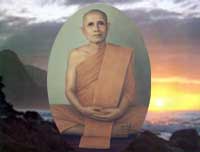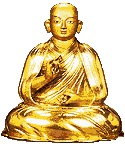
|
When faced with all the ups and downs of
life, |
|
My name is Prapant Svetanant, used to be an instructor at the Faculty of Economics, Chulalongkorn University in Bangkok. I am 61 years old (year 2004) and retire at the moment. The monk above is my dhamma teacher; his name is Luang Por Sua. Most of my understanding about Buddhism was from his teachings. With this page, I would therefore like to express my deepest gratitude for all of his efforts to make me understand Buddhism and know how to do the right practice. I have a long faith in Buddhism. During several years ago, I wrote many Buddhist articles related to my direct experiences. They were published in several issues of the Journal of Life of the Abhidhamma Foundation. Some were published in many newsletters of the Chulalongkorn University Faculty Club. These articles should be useful to my Internet friends. Thai articles were in the beginning prepared in PDF files due to technical constraints in Windows system. Later they were prepared in html format. Almost all English articles were prepared in html format. At present, the articles from distinguished authors were more and more included. The wholesome spirit of all articles, either Thai or English, is strictly maintained. |
![]()
|
Buddha teachings emphasise the importance of SATI at every step of our movement, both physical and spiritual. The meaning of SATI cannot be explained correctly with a certain definition in English. Some said SATI can mean "heedfulness," to which meaning I cannot agree. In the Buddha's teaching, The footprints of all land-bound creatures fit within the footprint of the elephant. So the elephant's footprint is said to be the supreme footprint in its size. Thus, all dhammas must have SATI as their spiritual base.
Without SATI, you can practice no dhamma. My study and practice about Buddhism have one main emphasis. That is SATI or "mindfulness" in English. It has become a powerful tool for my happy living for several years so far. Only you have the real faith in the Buddha's teachings and follow in his footsteps, you will have a happy life too. |

|
The Law of Kamma is the basic perception in Buddhism. Kamma does not simply mean action in usual language. Kamma is the mind's willing an action or intention. In Buddhism, what you think in your mind is already your kamma. Once kamma is committed, it is destined to a series of certain consequences; not only in this life,but in many lives thereafter. The movement of beings between rebirths is ordered and governed by the Law of Kamma. Acts of hatred and violence can lead to rebirth in a hell; acts of delusion can lead to rebirth as an animal and acts of greed can lead to rebirth as a hungry ghost. If you behave well in accordance with the Five Precepts, you are to be reborn as a human being again. Other higher rebirths include different levels of heavens. However, if bad actions are not detected during the rebirth, the man can be reborn as a human being again. Still, his record in past lives mould his consciousness, he will then have good or bad consequences after him always; e.g., stinginess leads to being poor, killing beings leads to frequent illnesses and short life, and anger leads to being ugly. In conclusion, all intentional actions, good or bad will lead to future results always. The Law of Kamma is a natural law, like a law of physics. Any holy Gods do not determine it. The Gods themselves are actually governed by the Law of Kamma. Kamma is thus a will. In this respect, Kamma can be committed through body, speech and mind. In Buddhism, a good action or good kamma is referred to as "kusala" and a bad action or bad kamma is referred to as "akusala. A kusala action (kamma) will produce an uplifting mental state in the doer; an akusala action (kamma)on the contrary involves an unhealthy state of mind that can lead to serious future consequences. |
| If you want a smiling face. | |
| If you feel lonesome. | |
| If money is everything for you. | |
|
|
If you are in love with someone |

| Dharma Ring Member Site | |
|
Ring Navigation Next Site Previous Site List Sites Random Site |
 Ring Home |
|
Join The Dharma Ring Sangha Discussion List Chat Room |
|
 |